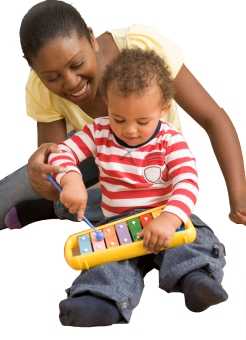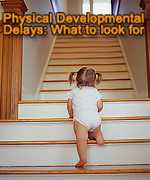Important Milestones: Your Child By One Year
Milestone Checklist
How your child plays, learns, speaks, acts, and moves offers important clues about your child’s development. Developmental milestones are things most children can do by a certain age.
Check the milestones your child has reached by his or her 1st birthday. Take this with you and talk with your child’s doctor at every visit about the milestones your child has reached and what to expect next.
What most children do by this age:
Social and Emotional
- Is shy or nervous with strangers
- Cries when mom or dad leaves
- Has favorite things and people
- Shows fear in some situations
- Hands you a book when he wants to hear a story
- Repeats sounds or actions to get attention
- Puts out arm or leg to help with dressing
- Plays games such as “peek-a-boo” and “pat-a-cake”
Language/Communication
- Responds to simple spoken requests
- Uses simple gestures, like shaking head “no” or waving “bye-bye”
- Makes sounds with changes in tone (sounds more like speech)
- Says “mama” and “dada” and exclamations like “uh-oh!”
- Tries to say words you say

Cognitive (learning, thinking, problem-solving)
- Explores things in different ways, like shaking, banging, throwing
- Finds hidden things easily
- Looks at the right picture or thing when it’s named
- Copies gestures
- Starts to use things correctly; for example, drinks from a cup, brushes hair
- Bangs two things together
- Puts things in a container, takes things out of a container
- Lets things go without help
- Pokes with index (pointer) finger
- Follows simple directions like “pick up the toy”
Movement/Physical Development
- Gets to a sitting position without help
- Pulls up to stand, walks holding on to furniture (“cruising”)
- May take a few steps without holding on
- May stand alone
Act early by talking to your child’s doctor if your child:
- Doesn’t crawl
- Can’t stand when supported
- Doesn’t search for things that she sees you hide
- Doesn’t say single words like “mama” or “dada”
- Doesn’t learn gestures like waving or shaking head
- Doesn’t point to things
- Loses skills he once had
If You’re Concerned – Act Early
Tell your child’s doctor or nurse if you notice any of these signs of possible developmental delay for this age, and talk with someone in your community who is familiar with services for young children in your area, such as your state’s public early intervention program. For more information, visit our "If You’re Concerned" web page or call 1-800-CDC-INFO.
“Learn the signs. Act early.” materials are not a substitute for standardized, validated developmental screening tools.
Adapted from CARING FOR YOUR BABY AND YOUNG CHILD: BIRTH TO AGE 5, Fifth Edition, edited by Steven Shelov and Tanya Remer Altmann © 1991, 1993, 1998, 2004, 2009 by the American Academy of Pediatrics and BRIGHT FUTURES: GUIDELINES FOR HEALTH SUPERVISION OF INFANTS, CHILDREN, AND ADOLESCENTS, Third Edition, edited by Joseph Hagan, Jr., Judith S. Shaw, and Paula M. Duncan, 2008, Elk Grove Village, IL: American Academy of Pediatrics.
- Page last reviewed: August 15, 2016
- Page last updated: August 15, 2016
- Content source:



 ShareCompartir
ShareCompartir